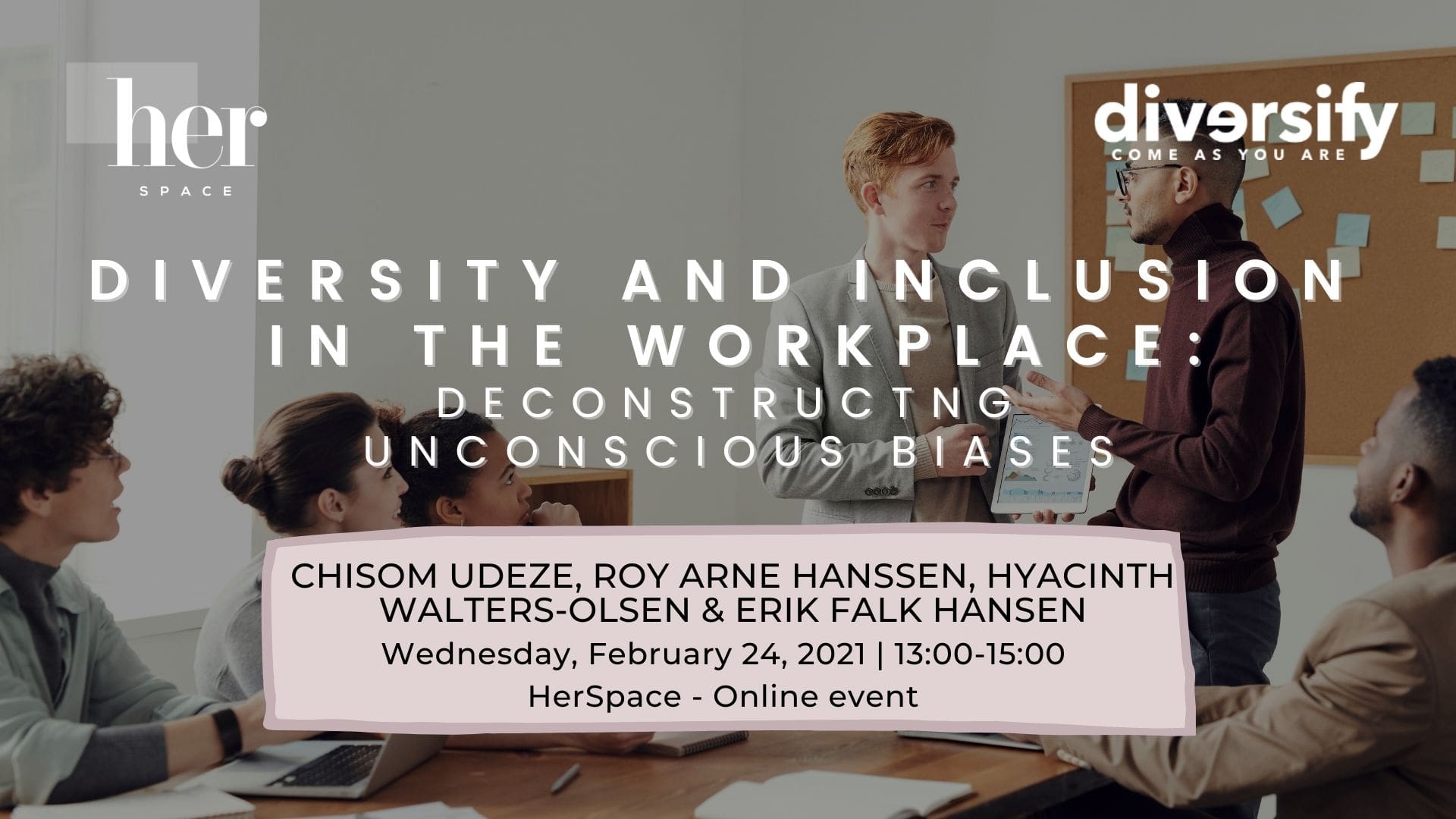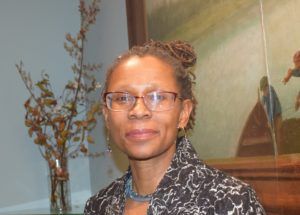The third session of the Diversity and Inclusion in the Workplace series looked at Deconstructing Unconscious Bias. Our panel this time consisted of our founder Chisom Udeze, who was joined by guests Erik Falk Hansen and Roy Arne Hanssen. Each of the speakers brough different experiences and perspectives. Erik, as the founder of AvantGarde Search, aims to modernize and make the recruitment sector more agile. Roy has long been involved in the tech start-up scene in Norway and has experience with international marketing and sales. His interest in Diversity and Inclusion spurs from his intersecting interest in human nature and politics. Chisom is an economist by trade and a serial entrepreneur who had developed the Diversity and Inclusion in the Workplace series as a way to foster inclusion in the workplace and the broader outcomes of improving mental health and wellbeing as well as societal and environmental relationships.
The discussion began by asking each of the panelists what unconscious bias meant to them and the breadth of the responses reflected just how complex this topic is. Erik began by linking unconscious bias to the emotions, fears and the gut feelings one gets in response to other people, a new situation or something that we are not used to. Linking this to his role in recruitment, Erik questioned whether our unconscious biases can lead us to employing people based on our gut feeling and those which we feel safest, or conversely, assuming that others, based on their identity, are less suited for a particular job. Chisom defined unconscious bias as the social stereotypes which affect our judgement of others, which is very much influenced by the social environment in which we were brought up into and our personal experiences. The definition provided by Roy come from an evolutionary perspective, drawing on the idea that we have two brains, the thinking brain which is responsible for our values and ideas, and the reptilian brain (the old brain), which is responsible for the existence of the unconscious biases that remain as a result of our survival instincts. Roy admits that our brain sometimes has the tendency to cheat us, in that sometimes it has not adapted to the modern world, where chances of survival are increasingly high.
Chisom also refers to implicit bias, which is subtly different to unconscious bias, as they both refer to a fundamental attitude which can lead to an automatic or unintentional response. To expand on the difference between these forms of bias, Chisom explored a list of synonyms:
– Unconscious: unaware, unknown, ignorant, oblivious.
– Implicit: understood, implied, inherent, contained.
So unconscious bias stands outside of our awareness, and implicit bias teeters on the edge of our consciousness, and questions whether we are aware of what is implied. And both manifest in a matter of seconds after encountering new situations or people, as we attach preconceived knowledge and experience to them.
In evaluating these perspectives- Roy coming from an evolutionary point of view where humans are predisposed to bias to a certain degree, and Chisom viewing bias as an outcome of the societal influences around us and the ways in which we compare our own identity to others- both agree that we have the ability to increase our awareness of how we respond, and the level to which we allow our bias to interfere with our decision making.
The conversation then turned to Erik, who reflected on his opposing experiences of working in both the UK and Norway to reveal how much work needs to be done here to shed discriminatory hiring practices. We also learnt that a biased approach to hiring sets the scene for discriminant attitudes to exist within the wider organizational culture. So then, how do we go about an entire company to address their unconscious bias, especially within leadership? Begin with education, of yourself and of your team. From Chisom’s working experiences, it is common for companies to look at the diversity of their teams on paper and evaluate the metrics, which is a good place to begin. But having promising numbers here cannot be the extent to which diversity and inclusion initiatives are taken. The end goal must be to ensure that employees genuinely feel that they belong. This requires that treatment is equal, the availability of resources equitable, and actions are fiercely inclusive. Only then will the environment of belonging create an environment which fosters diverse ideas, innovation and enhancement.
In relation to the workplace, Chisom explores forms of bias which can indeed interfere with our choices, and offset them with methods to mitigate these inclinations.
– Affinity bias is hiring for culture fit, choosing someone who will slide smoothly into the team rather than what they could contribute. To challenge this, actively note down the differences between the characteristics of the individual which influence your judgement, and the actual skills they possess which might add to the capacity of the company.
– Conformity bias is peer pressure, giving preference to those who should be hired in line with majority opinion. To prevent this from happening, write down your opinions about the applicant immediately before any discussion. This ensures that your judgement is impartial and not influenced by other opinions.
– Confirmation bias is judging people on the basis of their name, background, education. This can be overcome by asking standardized, skill-based questions so that applicants are evaluated in comparison to one another, and not on their response to a question which builds on an existing affinity or unconscious bias.
The session was highly interactive, with listeners both contributing from various platforms with reflections on their personal experiences with seeking employment and during employment, questions about what was being discussed, and their own interpretations of the questions that Hyacinth posed to the panelists. Some highlights included the usefulness of recruitment bots, the prevalence of discriminatory practices in various sectors and what is being done currently to mitigate these. The question of how to respond to someone who had displayed a clear bias was raised, to which Roy responded:“ask questions which make people think about why they had acted in a certain way. Is there a reason for…? I noticed that you… Why?”. This avoids making people defensive, and instead inspires personal reflection.
The conversation was valuable, delving into many important areas to consider such as the danger of tokenism, what can be learnt from big data to source the skillset you want to employ and the advancements of new technologies such as recruitment bots. Please take the time to listen, and relisten to the conversation in full because there are endless layers to unconscious bias and deconstructing them will take time, intention and a high level of critical self-reflection.




